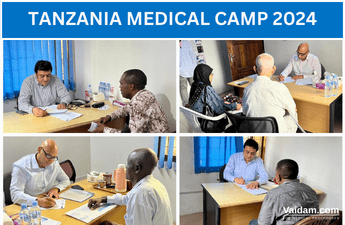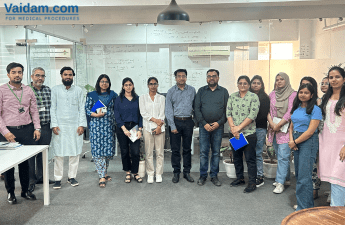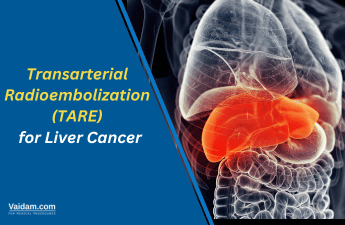
Colon cancer is a type of cancer affecting the colon. It is the 3rd most common cancer worldwide and can have severe consequences if not detected and treated early. Detecting cancer early significantly increases the chances of successful treatment.
Colon cancer can be cured entirely if it is localized to the bowel. Once diagnosed, the treatment of colon cancer involves a multidisciplinary approach, which may include surgery, chemotherapy, radiation therapy, targeted therapy, and immunotherapy.
You may be surprised to know colon cancer is not that prevalent in India compared to other nations. In India, it ranks 8th and 9th in the list of top cancer in men and women, respectively.
The country follows international guidelines and protocols for the treatment of colon cancer. There are several exceptional hospitals across the country that offer advanced diagnostic and treatment facilities. They provide quality treatment at affordable rates. The cost of treatment varies depending on multiple factors, including the hospital, location, and cancer stage.
Get in Touch with Medical Experts
Understanding Colon Cancer
Colon cancer arises when abnormal cells in the colon or rectum begin to grow uncontrollably, forming a tumor. The colon, more commonly known as the large intestine, is the last part of the digestive system.
Colon cancer generally develops in older adults. It begins as a tiny, benign group of cells called polyps. Cancer starts from the innermost lining of the colon, called mucosa. If left untreated, it spreads through tissues, muscles, and finally to the outer layer of the intestine.
Signs and Symptoms of Colon Cancer
The symptoms of colon cancer vary depending on the location and stage of the cancer. There won't be any noticeable symptoms in the early stages. However, as cancer progresses, common symptoms may include –
- Constant changes in bowel habits (such as constipation or diarrhea)
- Rectal bleeding
- Blood in the stool
- Abdominal pain or cramping
- Unexplained weight loss
- Fatigue
- A feeling of incomplete bowel evacuation
Risk Factors and Causes of Colon Cancer
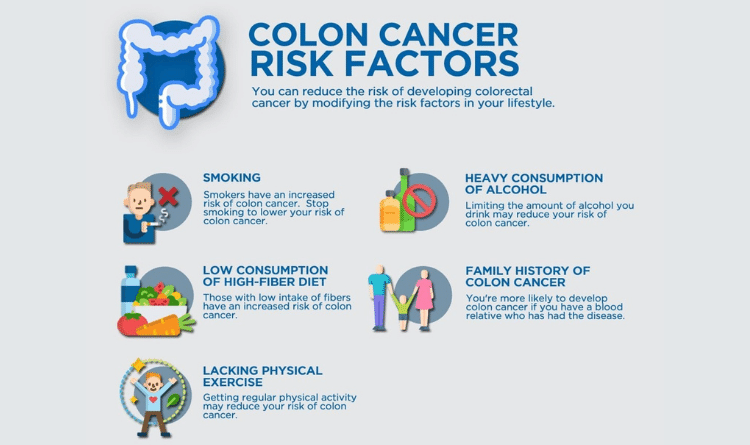
The exact causes of colon cancer have not been fully understood yet, but several risk factors have been identified.
These include –
- Age (the risk increases with age)
- A family history of colon cancer
- Certain genetic conditions
- History of inflammatory bowel diseases like Crohn's disease or ulcerative colitis
- A diet high in processed meats
- Sedentary lifestyle
- Obesity
- Smoking
- Heavy alcohol consumption
What is the Importance of Early Detection and Screening?
Early detection of colon cancer increases the likelihood of successful treatment and recovery. Screening tests such as colonoscopy, sigmoidoscopy, and fecal occult blood tests can help identify precancerous polyps or early-stage cancer. It is recommended that individuals undergo regular screening at the age of fifty or even earlier if there are specific risk factors or a family history of colon cancer.
Early detection of colon cancer offers several benefits, such as -
- Higher Cure Rate: When colon cancer is discovered at an early stage, the odds of a complete cure are significantly higher.
- Improved Treatment Options: Early-stage colon cancer is often confined to the colon's inner layers, making surgical removal easy.
- Reduced Disease Progression: Colon cancer tends to grow and spread over time. Detecting the cancer early makes it possible to prevent or delay its progression.
- Minimized Treatment Side Effects: Treatment for advanced-stage colon cancer, such as extensive surgery or aggressive chemotherapy, can be associated with more significant side effects and complications.
- Enhanced Quality of Life: Early detection and treatment of colon cancer can help preserve normal bowel function, and individuals may experience better long-term quality of life, reduced risk of bowel obstruction, and improved overall health.
What are the Different Treatment Approaches Used for Colon Cancer in India?
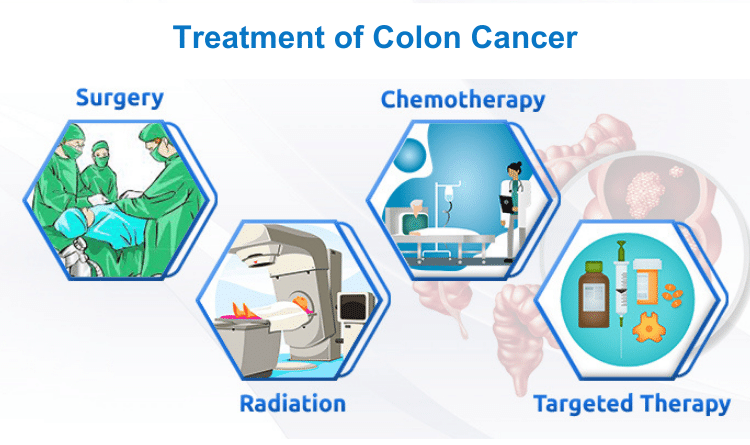
With the help of continuous research and advancements in medical technology, numerous treatment options are available for treating colon cancer in India. The oncologist may use a multidisciplinary approach based on your cancer stage and physical health. It involves combining different treatments for optimized results.
- Surgery is the primary treatment for cancer. The extent of colon cancer surgery depends on the stage of the cancer. In the early stages, segmental resection or partial colectomy may be performed, while in advanced stages, a more extensive surgery like a total colectomy or removal of nearby organs may be necessary. Polypectomy is another surgery used to remove polyps that are either cancerous or can be in the future.
- Chemotherapy uses drugs either to kill cancer cells or to stop their growth. The chemotherapy drugs can be given before surgery (neoadjuvant chemotherapy) to shrink tumors and after surgery (adjuvant chemotherapy) to destroy any remaining cancerous cells. The specific chemotherapy regimen and duration vary based on individual cases.
- Radiation therapy uses high-energy beams to kill cancerous cells. It is not commonly used in early-stage colon cancer but may be recommended in advanced stages or when cancer has spread to other organs. Radiation therapy is often combined with chemotherapy (chemoradiotherapy) for more effective treatment. Radiation therapy can be given externally using machines or internally by placing radioactive substances near cancer.
- Targeted therapy drugs specifically target the genetic mutations or proteins that help cancer cells grow. For example, medications like cetuximab and panitumumab target the epidermal growth factor receptor (EGFR). These therapies are generally used in advanced colon cancer cases and can also be combined with chemotherapy. Targeted therapy has the advantage of only affecting cancer cells and not harming normal cells.
- Immunotherapy enhances the body's immune system to recognize and attack cancer cells. PD-1 is a protein found on the exterior of T cells. When PD-1 gets attached to PD-L1, it stops the T cells from destroying cancer cells. Drugs like pembrolizumab and nivolumab, which inhibit attachment of PD-1 and PD-L1, are used in some cases of colon cancer with specific genetic features.
- Cryosurgery or cryotherapy is a treatment that uses instruments to freeze and destroy a cluster of cancer cells. The therapy uses liquid nitrogen or argon gas for freezing.
How Expensive is Treating Colon Cancer in India?
India is known for providing high-quality medical care at affordable rates. The cost of colorectal cancer treatment in India is between INR 2,50,000 to INR 5,00,000. International patients can expect the pricing to be USD 3200 – USD 6100.
The cost includes diagnostic tests, surgeon's fees, OT charges, hospital stay, medicines, and post-operative expenses.
- Chemotherapy: INR 45,000 – 65,000
- Colonoscopy: INR 5,000 – 25,000
- Radiotherapy: INR 1,85,000 – 2,50,000
- Immunotherapy: INR 1,80,000 – 2,40,000
- Targeted Therapy: INR 90,000 – 3,00,000
- Colectomy: INR 2,45,000 – 3,25,000
- Polypectomy: INR 25,000 – 90,000
Which are the Top Hospitals for Colon Cancer Treatment in India?
- Nanavati Super Specialty Hospital, Mumbai: Nanavati Hospital is a renowned healthcare institution known for its comprehensive medical services and advanced facilities. It is a 350-bed multidisciplinary hospital that offers a wide range of surgical and medical specializations. It has a dedicated department for cancer care, offering advanced diagnostic and treatment services. They have a team of experienced oncologists, surgeons, radiation oncologists, and support staff who provide complete care to cancer patients.
- Fortis Memorial Research Institute, Gurgaon: Fortis Memorial Research Institute (FMRI) is a multi-specialty tertiary care hospital located in Gurgaon, India. The hospital observes over 3.5 lakh patients annually. It has specialized centers of excellence that focus on specific medical areas, such as Fortis Cancer Institute, which is equipped with state-of-the-art medical technology.
- Apollo Proton Cancer Centre, Chennai, is the first proton therapy center in the Middle East and South Asia. Established in 2019, it is also India's first JCI-accredited cancer center. Apollo Proton Cancer Center has more than 50 medical and surgical oncologists.
- Max Super Speciality Hospital, Saket: Located in New Delhi, it is a super specialty hospital with 450+ doctors across 38+ specialties. The hospital has been accredited by JCI, NABH, NABL, and ISO. Max Hospital has a dedicated team of oncologists and gastroenterologists who work together to provide optimized treatment to colon cancer patients.
Conclusion
Colon cancer is a major global health concern, and it is no different in India. Early detection through screening and awareness campaigns is crucial for improving results. India has well-established medical facilities and experienced oncologists who are internationally trained in colon cancer treatment. They provide the most up-to-date treatment options based on the cancer stage, overall health, and individual factors. Early detection, timely treatment, and a comprehensive approach are crucial for successful treatment of colon cancer.






